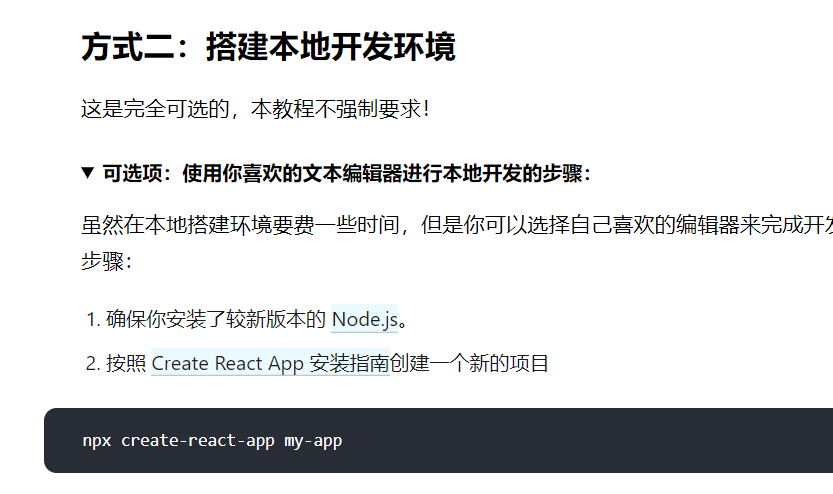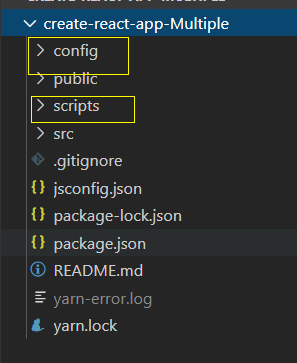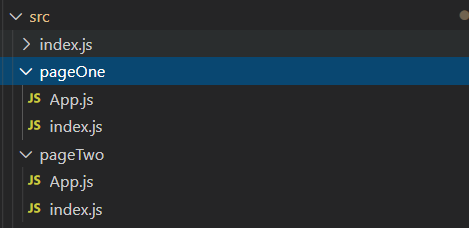react+mobx脚手架搭建多页面开发
本篇主要讲一些干货,便于正在搭建框架的人使用,从搭建到配置跨域,到打包配置 ,
1、使用脚手架搭建项目,并运行下看是否安装成功,详细内容查看官网 https://reactjs.bootcss.com/tutorial/tutorial.html#setup-for-the-tutorial 里的

2、npm run eject 暴露webpack,便于后面引入新的东西进行配置,就不用手动写webpack配置了,框架都给配置好了。
3、npm run eject之后会多出来两个文件夹:config里主要的是webpack.config.js文件,用于进行配置。scripts主要是项目运行及打包依赖的文件,一般不做改动。如需涉及改动下面会提及。

3、因为要使用mobx所以需要下载mobx和装饰器
"babel": { "presets": [ "react-app" ], "plugins": [ ["@babel/plugin-proposal-decorators", { "legacy": true }] ] },
5、安装依赖,这条命令安装上面 npm run eject改动文件之后的依赖
npm install
6、如何需要使用antd-mobile ,先用安装按需加载的插件
npm install babel-plugin-import --save-dev
7、安装antd-mobile
npm install antd-mobile --save
8、在package.json 里的babel里进行配置: [
"import", { "libraryName": "antd-mobile", "style": "css" } ]
9、使用css-module不用改变任何配置,直接参考css-module文章
新增less配置变量 const cssRegex = /\.css$/; const cssModuleRegex = /\.module\.css$/; const sassRegex = /\.(scss|sass)$/; const sassModuleRegex = /\.module\.(scss|sass)$/; const lessRegex = /\.less$/; // 新增less配置 const lessModuleRegex = /\.module\.less$/; // 新增less配置,这个其实不配置也行 增加module下面rule规则,可以copy cssRegex或者sassRegex的配置。 { test: sassModuleRegex, use: getStyleLoaders({ importLoaders: 2, sourceMap: isEnvProduction && shouldUseSourceMap, modules: true, getLocalIdent: getCSSModuleLocalIdent }, "sass-loader" )}, { test: lessRegex, exclude: lessModuleRegex, use: getStyleLoaders({ importLoaders: 1,// 值是1 modules: true, // 增加这个可以通过模块方式来访问css sourceMap: isEnvProduction && shouldUseSourceMap }, "less-loader" ), sideEffects: true}, // 这个测试删了也不影响{ test: lessModuleRegex, use: getStyleLoaders({ importLoaders: 1, sourceMap: isEnvProduction && shouldUseSourceMap, modules: true, getLocalIdent: getCSSModuleLocalIdent }, "less-loader" )},
12、使用vscode编辑器写mobx是会报红色波浪线,进行如下操作:操作完关闭编辑器再打开就可以了。
在根目录下创建一个jsconfig.json文件,写上
{ "compilerOptions": { "module": "commonjs", "target": "es6", "experimentalDecorators": true }, "include": ["src/**/*"] }
13、配置跨域
yarn add http-poxy-middleware -S
在src/根目录下新建 setupProxy.js文件 进行如下配置:
const {createProxyMiddleware} = require("http-proxy-middleware");
module.exports = function(app){
app.use(
createProxyMiddleware("/api",{
target:"http://47.96.0.211:9000",
changeOrigin:true,
pathRewrite:{
"^/api":""
}
})
)
}
如果跨域报错,就把createProxyMiddleware改成proxy;
14、安装axios
npm install axios --save-dev 在star.js中增加 const devServer = new WebpackDevServer(compiler, serverConfig); require('../src/setupProxy')(devServer);
15、书写axios请求方法,已经封装好,可以直接套用,可根据自己需要更改
function request( configObj) { return new Promise(function (resolve, reject) { axios({ url:'*************', method:"post", // params: params, data:configObj , // timeout: timeout, headers: { 'Content-Type': 'application/json', // 'token': window.sessionStorage.getItem('token') || '' } }).then(function (response) { if(response){ if (response.data && response.data.code) { resolve(response); }else { resolve(response); } }else { resolve(response); } }).catch(function (error) { Toast.fail( '网络异常,请稍后重试' ); reject(error); }) }) }
16、到这整个项目算是很完善了,为适应多项目开发,下面是配置多入口多出口。总结出两种办法,这里介绍第一种。
17、配置\config\webpack.config.js文件,修改入口和出口;在module.exports外配置就可以
入口参数配置,出口为 【入口的key】.html const entryParams = { pageOne: [ paths.appSrc + "/pageOne/index.js", ], pageTwo: [ paths.appSrc + "/pageTwo/index.js", ] };
18、在module.exports内找个位置放入如下代码:
let enterObjKeys = Object.keys(entryParams) || []; // 入口参数组装 出口参数组装 let outParams = []; enterObjKeys.forEach(item => { entryParams[item].unshift(require.resolve('react-dev-utils/webpackHotDevClient')); outParams.push(isEnvProduction && new HtmlWebpackPlugin({ inject: true, template: paths.appHtml, chunks: [item], filename: item + '.html', minify: { removeComments: true, collapseWhitespace: true, removeRedundantAttributes: true, useShortDoctype: true, removeEmptyAttributes: true, removeStyleLinkTypeAttributes: true, keepClosingSlash: true, minifyJS: true, minifyCSS: true, minifyURLs: true, } })); });
19、配置entry出口
Object.assign({}, !isEnvProduction ? {
index: [
require.resolve('react-dev-utils/webpackHotDevClient'),
paths.appIndexJs,
]
} : entryParams),
20、配置 new HtmlWebpackPlugin,对照看下之前的直接加入下面的代码
isEnvDevelopment &&
new HtmlWebpackPlugin(
{
inject: true,
template: paths.appHtml,
chunks: ["index"],
filename: 'index.html',
}),
...outParams,
isEnvProduction &&
shouldInlineRuntimeChunk &&
new InlineChunkHtmlPlugin(HtmlWebpackPlugin, [/runtime-.+[.]js/]),
21、在src下创建两个文件夹,代表两个不同的项目

22、pageOne和pageTwo下面的两个js文件跟src目录下自带的App.js和index.js内容是一样的。
23、修改src下面的index.js引入方式,每次只能运行一个
import './pageOne' // import './pageTwo'
全部完成,可以试下效果了,超级好用!
------------恢复内容结束------------


